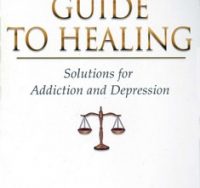« Return to 2020 January - Finding Your Way Issue Index
Book review: A Lawyer’s Guide to Healing

“If I had to pick the most common malady affecting lawyers, it would be alcoholism.” This is according to Don Carroll, former director of the North Carolina Lawyer’s Assistance Program and author of A Lawyer’s Guide to Healing: Solutions for Addiction and Depression. In the book, he examines how addiction and depression manifest in the legal profession in different ways than in the general population, and treatment options best suited to lawyers. The main focus is on alcohol abuse, but the lessons can be applied to other addictions like drugs and gambling.
Carroll believes there are traits prevalent in a lawyer’s personality that make them thrive in the work-heavy, adversarial environment of the law, but can also make lawyers more prone to addiction and depression. He sees two broad traits common in the legal profession: the romantic idealist and the judge.
The romantic idealist sees the world how it ought to be, and feels the weight of injustice. Frustration at not being able to always achieve that justice, if not handled in a healthy way, can cause some to turn to alcohol to numb these feelings.
The personality of the judge is detached and analytical, shutting off normal healthy feelings. They tend to be too judgmental of themselves. In this case, alcohol can become an appealing way to both loosen up and make it easier to ignore feelings of self-judgment. So drinking or drugs can seem to (temporarily) help deal with the fear of losing a case, the bitterness when justice isn’t seen to be done, and the need to feel in control despite drowning in workload.
These same personality characteristics that make an effective lawyer (e.g., idealism, perfectionism, and detachment) can make it difficult to admit there’s a problem. A person whose identity is tied to achieving success can have a hard time admitting failure. Even when a lawyer knows there’s a serious problem, shame and secrecy can prolong the situation as their practice spirals out of control.
The damage of addiction isn’t limited to the addict. Family, friends, clients and colleagues of the lawyer suffer too. And the problem can span generations, both because of a biological component to addiction and growing up in a household dealing with an alcoholic parent. Carroll has worked with lawyers who grew up as the children of addicts, and they can display their own personality flaws developed as coping mechanisms: a need to please, an inability to engage emotionally or a fear of not being in control after growing up in a chaotic environment. All of this can negatively affect practice habits, even if they don’t lead to addiction for themselves.
Just as there may be traits particular to the legal profession when it comes to addiction, Carrol believes there are treatment options best tailored to lawyers too. He advocates treating the mental and spiritual aspects of the problem, not just the physical. So, in addition to describing the physiological causes and treatments of addictions and clinical depression, he strongly believes counselling and peer supported programs like Alcoholics Anonymous are crucial to addressing other underlying issues.
Carroll’s ideas on the spiritual or ‘positive thinking’ solutions may not appeal to all lawyers (particularly those with a preference for purely scientific answers to addiction problems). The later chapters of the book suggest that lawyers consider their emotional attitudes, take inventory of their motivations and feelings, and consider how they relate to colleagues and friends. The aim is to break the mental patterns that contributed to the addiction in the first place.
If you’re a lawyer or know a lawyer who may be struggling with addiction, this book is a good starting point on the road to getting help. It gives a general overview of how addiction works on both a physical and mental level, and suggests a variety of ways to approach treatment. It is particularly useful in examining how addiction manifests in the legal profession differently than the general
More reading about lawyers, addiction and depression
The Addicted Lawyer: Tales of the Bar, Booze, Blow, and Redemption by Brian Cuban
Brian Cuban was a successful lawyer also struggling with depression, alcohol and cocaine addictions. In this book, he takes an in-depth look at why there is such a high percentage of problematic alcohol use and other mental health issues in the legal profession. What types of therapies work? Are 12-step programs the only answer? Brian also includes interviews with experts as well as others in the profession who are now in recovery.
The Full Weight of the Law: How Legal Professionals Can Recognize and Rebound from Depression by Jeffrey Fortgang & Shawn Healy
Law students and lawyers report having a significantly higher rate of depression than the general population. When untreated, depression affects lawyers, their clients, families, friends, and colleagues. Unfortunately, for many struggling with depression, it is only when they reach their breaking point, or encounter unavoidable professional consequences, that they feel ready to reach out for assistance. Taking steps to address problems could save a lawyer much hardship later on.
